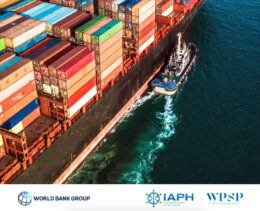Digitalizing the Maritime Sector Set to Boost Competitiveness and Resilience of Global Trade
Joint report by the World Bank and IAPH to assist ports and maritime transport community accelerate digitalization and minimize ship-shore human interaction and COVID-19 risks. WASHINGTON, January 21, 2021—A new report was launched by the World Bank and the International Association of Ports and Harbors (IAPH) shows that better digital collaboration between private and public entities across the maritime supply…


